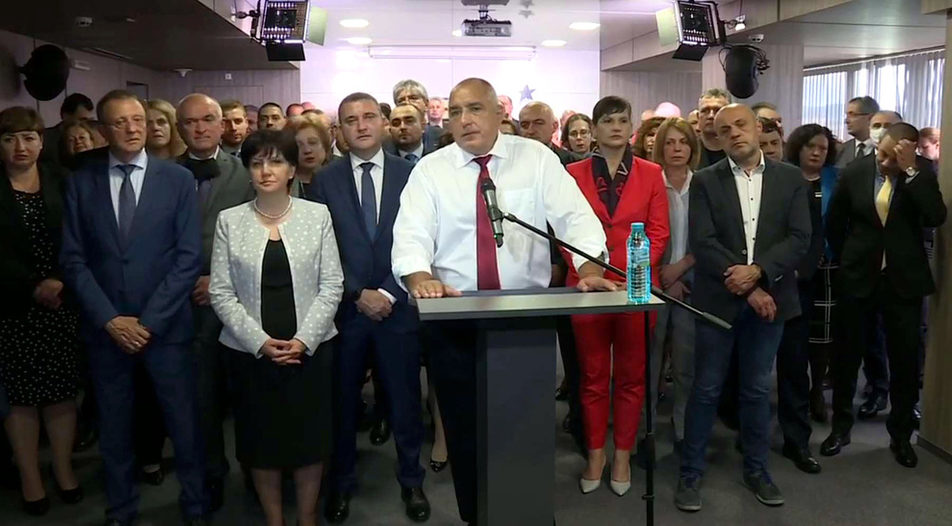At the beginning of the new political season, Bulgarian Prime Minister Boyko Borissov has attempted to strengthen his position by proposing three ministerial changes.
Formally, the resignations of the three ministers - of the interior, regional development and transport - were a response to a tragic traffic incident in late August in which 17 people died. However, the ensuing government reshuffle was obviously aiming at something more than just taking political responsibility for the loss of lives. Namely, the idea of the PM seemed aimed at allaying public discontent with the general performance of the government which has been building up over the summer.
First, in recent months the governing majority got entangled into scandals involving openly lobbyist draft-legislation, the most recent of which concerned the regulation of tobacco products and the contractual obligations to the state of the company that had privatized Navibulgar (the former state-owned maritime shipping company) back in 2008.
Next, the electronic corporate register collapsed in August and its operation could not be restored for more than ten days, which was a significant embarrassment for the government.
Third, the junior partner in the government coalition, United Patriots, staged a summer show of mutual accusations of lobbyism and dependence on corporate interests. The main exchanges were between Volen Siderov (Ataka) and Valeri Simeonov (NFSB) - two of three chairpersons of the nationalist alliance, with the traded insults so harsh that they raised questions about the future of the coalition.
Against this background Mr Borissov decided to repair and strengthen his parliamentary majority by asking - in essence - for a confidence vote by means of proposing three ministerial changes. The move was risky because apparently the prime minister had not consulted in advance either the parliamentary group of his GERB party, or his coalition partners.
Predictably, the resignations created different and conflicting responses in the parliamentary majority: both GERB and their coalition partners, the self-proclaimed Patriots objected, particularly because they had not been consulted in advance. Therefore, Mr. Borissov was forced to postpone the final decision on the resignations for a week, until a meeting of the council of the governing coalition. This delay helped the PM consolidate support for his proposals for replacement, and the three of them were ultimately endorsed by the leaders of the governing parliamentary majority.
The main question is whether this political maneuver is going to have its intended effect: namely, to strengthen the position of the PM and to consolidate parliamentary support for him. There are good reasons to doubt that.
On the one hand, the very way the resignations were announced and handled confirmed the impression that there are multi-dimensional tensions within the governing coalition. Ultimately, the PM managed to push through his proposals, but there was some serious resistance to them. On the other hand, the three resignations did not close the debate about other possible ministerial changes. The PM himself has said that such additional governmental reshuffles might be expected. This is a guarantee for a turbulent political season.
All in all, the mini-government crisis is not an existential threat for the third cabinet led by Boyko Borissov. It is a sign, however, that the jockeying for position for the next elections has already begun. In 2019, Bulgaria will hold both European Parliament elections and local elections - two opportunities to call snap parliamentary elections as well.
The mini-government crisis signals no substantive change of policy in Mr. Borissov's government. The main challenges before it remain the same: growing dependence on specific corporate interests, inability to deal meaningfully with corruption and judicial reform, and ambiguous position vis-à-vis Russian-sponsored economic projects such as the Belene nuclear power plant project frozen over lack of funding during Mr. Borissov's first mandate as PM.
Exactly those issues, not the three ministerial resignations, are rocking the government's boat. If the government fails to address them effectively, early elections might come on the horizon.
Daniel Smilov is a Bulgarian comparative constitutional lawyer and political scientist. He is program director at the Centеr for Liberal Strategies, Sofia, teaching Comparative Constitutional Law at the Central European University, Budapest, and Political Theory at the University of Sofia
At the beginning of the new political season, Bulgarian Prime Minister Boyko Borissov has attempted to strengthen his position by proposing three ministerial changes.
Formally, the resignations of the three ministers - of the interior, regional development and transport - were a response to a tragic traffic incident in late August in which 17 people died. However, the ensuing government reshuffle was obviously aiming at something more than just taking political responsibility for the loss of lives. Namely, the idea of the PM seemed aimed at allaying public discontent with the general performance of the government which has been building up over the summer.












